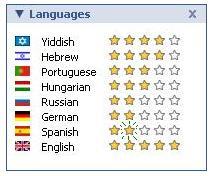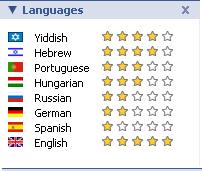![]() I’m planning on starting Yiddish classes again in a few weeks. I tried that a few months ago, but it didn’t work out so well, mostly because not enough students showed up (the class started with about two people, then one, then none). Hopefully I’ll be able to get a better response this time. They’ll be on Sundays, and several people have said they’re interested. This time, I hope, the students will be more committed (and not absent) than last time. (I know some of them personally already, so there may be justification here for hope.)
I’m planning on starting Yiddish classes again in a few weeks. I tried that a few months ago, but it didn’t work out so well, mostly because not enough students showed up (the class started with about two people, then one, then none). Hopefully I’ll be able to get a better response this time. They’ll be on Sundays, and several people have said they’re interested. This time, I hope, the students will be more committed (and not absent) than last time. (I know some of them personally already, so there may be justification here for hope.)
Another problem with last time (in my mind) was that, well, it’s hard to learn a language, and especially absorb vocabulary, on an hour-and-a-half a week. That way, either people can’t keep up, or I can’t put in nearly as much vocabulary as I’d like. Fortunately, a potential solution has presented itself since then, namely, my dear friend Mr. Anki. Amazingly, I won’t be the first to use Anki in a Yiddish class.
There are a couple ways I can think of that Anki would improve my class. Firstly, I’d be able to introduce far more vocabulary than otherwise with the expectation that the class will actually be able to retain it. Secondly, it can provide a way for the class to partially learn the vocabulary before class so that we can concentrate in class on how to use the vocabulary and building conversational skills. Thirdly, Anki comes with an audio feature so that I can include a sound file of each vocabulary item being pronounced on the flashcard. This may obviate the need to use transliteration, which would be a great help in maintaining the connection of each word to its representation in ייִדישע אותיות (Yiddish letters).
Speaking of Anki, you may be wondering how my own Anki experiences are going. Well, I now have 2136 cards in my Russian deck, and 511 in my Yiddish deck. (These numbers aren’t as big as they seem, since Anki stores Production (English → Russian) and Recognition (Russian → English) as two different cards. Some day I’ll explain how my Yiddish deck can have an odd number of cards.) A couple weeks ago, I was getting 200+ cards a day on Russian, which was too much, so I quit adding cards for a while and now it’s down to less than 50 a day. A couple days ago I started adding again, and am now up to word 1550 in my frequency word list. (See previous posts for an explanation of all this.)
In other news on the language aquisition front, I went to a Spanish language meetup the other night where I had a 2½-hour-long conversation (in Spanish) with a native Spanish speaker from Colombia! Given that I can do this, I guess it’s a little silly to only be giving myself one star on my language proficiency chart. I orginally wanted to up that to two when I finished Pimseur, but my progress there has been mysteriously (and happily) slowed recently, and I’ve been making up the differences with various Podcasts and other methods, so I guess it’s time to give myself two stars. Yay!
with a native Spanish speaker from Colombia! Given that I can do this, I guess it’s a little silly to only be giving myself one star on my language proficiency chart. I orginally wanted to up that to two when I finished Pimseur, but my progress there has been mysteriously (and happily) slowed recently, and I’ve been making up the differences with various Podcasts and other methods, so I guess it’s time to give myself two stars. Yay!
 A very little bit about Baruch: He’s 19 years old (five years my junior), and had been living in LA for about 12 of those years, until a couple weeks ago, when my family moved to Cleveland, Ohio. Baruch started studying Spanish (to my knowledge) several months ago. He began listening to Pimsleur lessons I had put for my mom onto her mp3-player (these amounted to the whole of Pimsleur Spanish I), and also started going through some textbook. He seemed somewhat serious about it, and so this was a good part of the motivation for me to begin learning Spanish, for if my brother is learning another language, it would be silly for me not to do the same. (If you don’t see the logic here then you haven’t been reading enough of this blog.)
A very little bit about Baruch: He’s 19 years old (five years my junior), and had been living in LA for about 12 of those years, until a couple weeks ago, when my family moved to Cleveland, Ohio. Baruch started studying Spanish (to my knowledge) several months ago. He began listening to Pimsleur lessons I had put for my mom onto her mp3-player (these amounted to the whole of Pimsleur Spanish I), and also started going through some textbook. He seemed somewhat serious about it, and so this was a good part of the motivation for me to begin learning Spanish, for if my brother is learning another language, it would be silly for me not to do the same. (If you don’t see the logic here then you haven’t been reading enough of this blog.)
